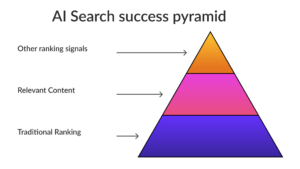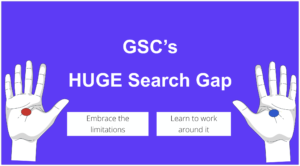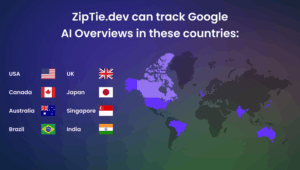Monitoring AI platforms that matter the most
The Big Three AI Search Engines
As AI-powered search becomes mainstream, businesses face a growing challenge: which platforms should they actually be tracking?
Three platforms currently handle the majority of AI-powered searches: Google’s AI Overviews, ChatGPT, and Perplexity. These aren’t just the biggest players – they’re the ones shaping how people discover and interact with information online.
This is where tools like ziptie.dev/ come into play. Unlike many competitors relying on outdated models with knowledge cutoffs in 2024, ziptie.dev/ uses real-time brand tracking across these key AI search engines, giving businesses visibility into how their brand appears in the AI-powered search results that matter most.
Flexible Query/prompt generator
One of the trickiest parts of monitoring your brand in AI search results is figuring out what search terms you should actually track.
Many tools focus solely on traffic demand – while this was often a good strategy for traditional SEO, we believe it simply falls short in AI search, at least currently when there is a lack of relevant, useful data.
ZipTie’s query generator streamlines the process of query generation.
Simply input any URL – whether it’s your homepage, a product page, or a blog post – and the tool analyzes your content to generate a tailored list of relevant search terms.
This eliminates the guesswork and ensures you’re tracking the queries that actually matter for your specific content and industry.
Focus on Metrics That Actually Drive Business Results
The 3 Things That Matter Most for AI Search Success
We’ve identified the metrics that actually impact your business, especially if you’re in SaaS space. ziptie.dev/ allows you to track:
- Mentions – Are AI search engines finding and talking about you? Every time an AI search engine mentions your brand, product, or service in a response, you’re gaining valuable brand exposure
- Citations – A citation occurs when an AI search engine links back to your website as the source of information. For example, if someone asks “What are the best project management features?” and the AI responds with information from your blog post while providing a clickable link to that post, that’s a citation.
- Sentiment – If your brand is shown in AI responses in a positive, negative or neutral way.
Competition analysis
ziptie.dev/ shows you which of your competitors are the most successful in AI search engines.
But here’s what makes it interesting: unlike most of our competitors, we also compare this to regular Google search rankings.
Why does this matter?
- Using ziptie.dev/ you might discover that a competitor who barely shows up on Google’s first page is dominating ChatGPT Search results. Or that a brand with strong SEO isn’t getting mentioned by AI engines at all.
- AI Search engines often rely on ranking in traditional search results. So when you’re not successful in AI search, it may be caused by issues with ranking in traditional SEO.
Understanding these nuances can be the foundation for your AI search success.
Platform-by-Platform Breakdown
Most tools just give you one overall ranking. ZipTie breaks it down by each AI search engine – Google AI Overviews, ChatGPT Search, and Perplexity – because performance varies between platforms.
We also separate competitors into two lists:
- Citation leaders: Who is used as a source of AI answers most frequently.
- Mention leaders: Who is mentioned most frequently.
This shows you exactly where each competitor is strongest, so you know which platforms to focus your efforts on.
List of the most influential sources
This feature is rare among AI search monitoring tools — only a handful like ziptie.dev/, Profound, and Peec.ai offer it. But it’s incredibly valuable for strategic planning.
Source analysis in ziptie.dev/ reveals three types of reports:
Most Influential Sources – see which websites AI search engines rely on most heavily in your industry. This data can help you identify potential partnership or guest posting opportunities – if you can get your content featured on these influential sites, you’re more likely to appear in AI search results.
Spying on Competitors – using ziptie.dev/ you can view what specific content on competitor websites gets cited by AI engines. You can use this information to create similar (but better) content for your own brand, targeting the same topics and angles that AI search engines find valuable.
Discover Your Top Content – see which of your current articles and pages are already being used by AI search engines. With this data, you can refine and expand these high-performing pieces to increase their chances of being cited even more frequently.
Content optimization for AI – module – UNIQUE!!!
Content Optimization: The Feature That Sets ZipTie Apart
The AI search monitoring landscape is crowded, but most tools only tell you what’s happening – not what to do about it. ziptie.dev/ is different. It’s the only platform that provides specific, actionable recommendations to improve your content’s performance in all these platforms: AI Overviews, ChatGPT, and Perplexity.
How It Works
Our content optimization module examines your existing pages and identifies gaps that prevent AI search engines from featuring your content. The system detects which topics AI engines cover when answering relevant queries, then analyzes whether your website addresses those topics comprehensively enough.
For example, in a sample analysis for Jotform (a form-building tool), we examined the query “Is Jotform good for beginners?” The optimization report revealed specific content gaps and opportunities for improvement:
For a detailed walkthrough of how to use this feature, read our complete guide: 3 Steps to Optimize for AI Search Using ZipTie.
Better sentiment analysis
Most AI search monitoring tools either lack sentiment analysis entirely or rely on basic positive/negative scoring that misses important nuances. ZipTie takes a different approach with contextual sentiment analysis.
How Contextual Analysis Works
Instead of simply labeling an entire response as positive or negative, ZipTie analyzes sentiment based on what the user actually cares about. For example, if someone searches “Is Samsung S25 good in terms of battery?” and the AI response mentions several negative aspects but praises the battery life, traditional sentiment analysis might flag this as negative overall.
ZipTie’s contextual analysis recognizes that “battery” is the key concern in this query. It focuses specifically on how the battery is discussed, potentially scoring this as positive sentiment since the AI response addresses the user’s main question favorably – even if other aspects of the phone may receive criticism.
This contextual approach provides a more accurate picture of how your brand is perceived in relation to what users actually care about, rather than generic sentiment that might miss the mark.
Flexibility
Flexible Query Management: Monitor What Matters to Your Business
ZipTie gives you complete control over which search queries to track, letting you tailor monitoring to your specific business needs.
Multiple Ways to Build Your Query List
You can use our automated query generator to discover relevant search terms based on your content, or create custom queries manually. This flexibility ensures you’re tracking the searches that actually matter for your business goals.
Brand-Specific Monitoring
For businesses managing multiple brands or product lines, ZipTie allows you to set up separate monitoring for each brand. This granular approach means you can track how different parts of your business perform in AI search results, giving you better insight into where to focus your optimization efforts.
This customizable monitoring approach ensures you’re not stuck with generic tracking—you get the specific insights your business needs.
Most robust export
While ZipTie doesn’t currently offer an API, it provides comprehensive data exports that give you maximum flexibility for custom analysis.
ZipTie’s exports include the full text of AI search engine responses, not just summaries or metrics. This means you can perform your own advanced analysis on exactly how your brand appears in AI search results, analyzing tone, context, positioning, and competitive mentions in detail.
Comprehensive Dataset
Beyond the responses themselves, exports include complete lists of all brands mentioned and all sources cited by AI search engines. This rich dataset opens up possibilities for trend analysis, competitive intelligence, and identifying patterns that standard dashboards might miss.
This export-first approach means you’re not limited by ZipTie’s built-in reporting—you can create custom dashboards and analyses tailored to your specific business questions and reporting needs.
14-Day Free Trial: Try Before You Commit
Most basic AI search tracking tools offer free trials, but when it comes to the more established players, you’re often forced to either schedule a demo or pay upfront to see what you’re getting.
ZipTie takes a different approach. We offer a 14-day free trial with full access to all features—no limitations or demo calls required. While we do require a credit card to prevent fraud, you can easily cancel if ZipTie isn’t the right fit for your needs.
This lets you test the platform with your actual brand and queries before making any financial commitment.
What Makes ZipTie Different: The Bottom Line
While most AI search monitoring tools simply track what’s happening, ZipTie is built to help you actually improve your results.
The platform combines strategic focus (monitoring the three AI search engines that matter most) with unique capabilities that competitors don’t offer – particularly the content optimization module that provides specific, actionable recommendations for better performance and contextualized query analysis.
Rather than overwhelming you with data, ZipTie gives you the insights and guidance needed to win in AI search. It’s the difference between knowing where you stand and knowing exactly how to get ahead.






